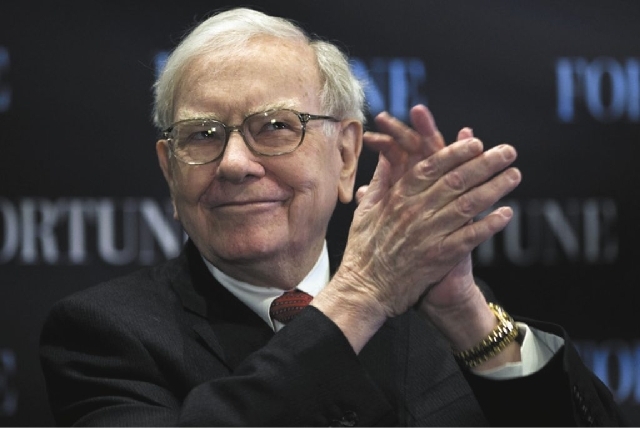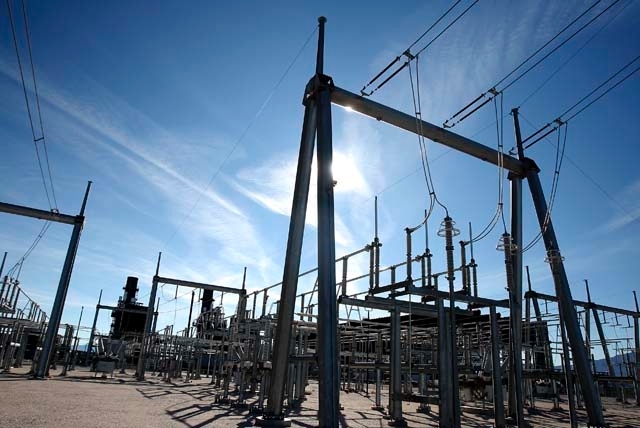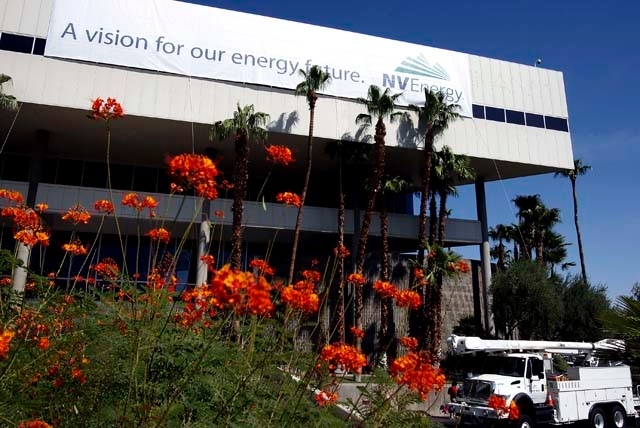NV Energy to be acquired by Warren Buffett



Nevada’s corporate community got a big jolt Wednesday when the world’s best-known investor dropped a few billion bucks on the local power company.
Warren Buffett’s Iowa-based MidAmerican Energy Holdings Co. announced plans to buy NV Energy in a $10 billion deal. About $5.6 billion in cash will go toward buying all of the utility’s outstanding shares at $23.75 each. The rest is the acquisition of company debt. MidAmerican, which already owns a renewables division, a transmission business and the Kern River Gas Transmission Co., said it plans to leave NV Energy’s executives in place.
Few business leaders are as admired as Buffett, and his decision to invest here puts Nevada’s corporate world on the map, said Robert Lind, managing partner of local investment brokerage Berkshire Bridge Capital, which is unrelated to Buffett’s Berkshire Hathaway conglomerate.
“Anytime we get someone like Warren Buffett to acquire a Nevada company and not get rid of management, it raises the level of perceived sophistication that there are well-managed companies here,” Lind said. “This will shine a flashlight on Nevada for sure.”
That higher profile culminates three years of strategizing on NV Energy’s future, said board Chairman Phil Satre. When MidAmerican approached NV Energy earlier this year, it didn’t take long to see the possibilities, NV Energy President and CEO Michael Yackira added.
“It’s clear from their track record in the states they operate in that they focus on customer satisfaction and expanding renewable energy,” Yackira said. “Their expertise developing wind projects in Iowa and solar energy in California can be brought to bear to develop those resources more quickly here.”
In a statement, Buffett was equally effusive about NV Energy.
“This is a great fit for Berkshire Hathaway, and we are pleased to make a long-term investment in Nevada’s economy,” Buffett said in a statement. “Through MidAmerican, we have found in NV Energy a great company with similar values, outstanding assets and a superb management team.”
The boards of both companies unanimously approved the deal at 1:01 p.m. Wednesday.
WHAT MAY CHANGE
The move kicked off a flurry of analysis on how — or whether — the deal would affect the state’s power markets and consumers. For now, at least, most changes will happen behind the scenes, with little effect on ratepayers.
Perhaps the biggest difference is that NV Energy will go from having thousands of shareholders to just one.
About 25 institutions, including JP Morgan, Vanguard and T. Rowe Price, hold 60 percent of NV Energy shares. The rest are individual investors. NV Energy’s dividends flow to those investors, but after MidAmerican takes over, dividends will stay local and be reinvested in the company, Yackira said. Plus, there may be more capital for new projects.
“It has never been their (MidAmerican’s) method of operation to extract dividends from the companies they invest in,” Yackira said. “They’re looking for ways to invest more into our state, and if there are opportunities to invest over and above what we have as cash flow, they will provide that to us.”
Borrowing costs may come down too, as the two combined companies — MidAmerican has 7 million gas and electric customers worldwide, and NV Energy has 1.45 million in the state — mean a stronger single business, Yackira said.
NV Energy also plans to look at its customer-service practices, Yackira said. There is no current plan to consolidate call centers or customer service activities, and its 2,600-employee roster should mostly be unchanged, Yackira said. But both NV Energy and MidAmerican said they’re open to new approaches that would improve service.
Eric Witkoski, the state consumer advocate who represents residential ratepayers in utility rate cases, said he definitely sees room for improvement, and it could take MidAmerican to do it.
“The current management of (NV Energy) has cut back on such services in what appears to be an attempt to improve profitability to make it more attractive to an acquiring company,” Witkoski said. “Hopefully, a new company would provide better customer service while managing rate impacts.”
There is one group of people NV Energy knows it no longer will keep. As it goes private, the board of directors will dissolve. Nor will the company need investor-relations staffers.
Otherwise, many of the company’s operations should stay the same for the foreseeable future.
WHAT STAYS THE SAME
NV Energy will stay headquartered here and operate as an autonomous unit, MidAmerican said. That means few changes in day-to-day operations.
More importantly, don’t expect immediate changes in your power bill. NV Energy’s general rates are locked in by state law for three years at a time. The next rate case isn’t up until 2014, and rate changes couldn’t take effect before Jan. 1, 2015, though fluctuating natural gas prices could affect what you pay for direct power costs before then.
Also, count on continued emphasis on renewable energy. MidAmerican recently announced it would invest
$1.9 billion in wind farms in Iowa, and Greg Abel, the company’s chairman, president and CEO, said in a statement he’s excited about supporting NV Energy’s focus on boosting its green power portfolio.
Those ecofriendly overtures probably won’t ease pressure on NV Energy to dump its coal-fired power plants — in particular, its Reid Gardner station near Moapa. The Sierra Club released a statement noting that MidAmerican’s PacifiCorp subsidiary is the largest operator of coal plants in the West. It criticized the company’s “backward-looking insistence” on “spending ratepayer dollars to keep old coal plants running.”
“It’s time to transition dirty coal out of the Berkshire Hathaway portfolio,” the group said.
But at least one public official who has been at odds with NV Energy over the size of its green portfolio offered an olive branch Wednesday.
“I’ve spoken to Warren Buffett, Michael Yackira and Phil Satre, and it is not often I have been as enthused about a deal as I am now,” Senate Majority Leader Harry Reid, D-Nev., said in a statement. “I am elated. It is really good news for Nevada that Warren Buffett wants to invest $5.5 billion in our state. He told me that he loves Nevada and now has an excuse to come here more often.”
For NV Energy’s two big, ongoing capital investments, it should be business as usual. The buyout needs the approval of NV Energy’s shareholders, the state Public Utilities Commission, the Federal Energy Regulatory Commission and the U.S. Department of Justice, so it probably won’t close before the first quarter of 2014, Yackira said. By then, NV Energy’s $301 million NV Energize smart meter initiative and its $552 million, 235-mile One Nevada transmission line, should be finished.
After the sale wraps, don’t expect many changes in NV Energy’s C suite: MidAmerican executives “are very excited about the strategic direction of Michael Yackira and his team,” Abel said. “It is an excellent fit with our business model and customer focus.”
Lind agreed NV Energy’s leadership probably would stay intact.
“This would have to be perceived as a compliment to the management team at NV Energy and a really positive reflection on a well-run organization,” Lind said. “Warren Buffett doesn’t invest in companies that need a turnaround.”
In fact, NV Energy already has forged its turnaround.
FROM PAST TO FUTURE
The company has gone in the past decade from owning 39 percent of its generation to having an industry standard of nearly 80 percent; it spent $4.3 billion to get there. Having its own power sources made service more reliable, which in turn attracted investors: NV Energy’s market cap soared 350 percent, to
$4.1 billion, between 2003 and 2012. The company restored dividends in 2008, five years after it suspended them, and quarterly dividends per share rose from 8 cents to 17 cents from 2008 to 2012.
Despite those improvements, NV Energy executives found themselves marveling at Wednesday’s turn of events. For Yackira, who came to NV Energy in 2003, and Satre, who joined the utility’s board in 2005, striking a deal with Buffett would have been inconceivable five years ago.
“I would have said, ‘I can’t imagine that,’ ” Satre said. “We had our heads down and were looking at the road ahead. It was a pretty short road at that time, just going quarter-to-quarter and year-to-year. This kind of agreement was not something we were thinking about.”
Added Yackira: “I think it really comes down to the employees of this company. They stuck with a generation-building strategy that was tough to do when we first embarked on it. They put their nose to the grindstone to deliver. I’m so proud of the fact that an investor like Warren Buffett, who could invest anywhere, chose our company as his first really big foray into Nevada.”
This may not be the final step in NV Energy’s recovery. Witkoski said it’s early in negotiations, and another suitor could offer a proposal.
He also cautioned that Senate Bill 123, a proposed state law that NV Energy says would let it close the 800-megawatt Reid Gardner early and replace it with 900 megawatts of renewables, hasn’t passed the Legislature yet.
“We are surprised at the timing,” Witkoski said, because it seems the MidAmerican buyout would depend at least in part on SB123’s passage.
The deal’s announcement came just before markets closed. NV Energy’s shares shot up $4.45, 23.1 percent, on the New York Stock Exchange in after-hours trading, closing at $23.73.
Contact reporter Jennifer Robison at jrobison@reviewjournal.com or 702-380-4512. Follow @J_Robison1 on Twitter.












